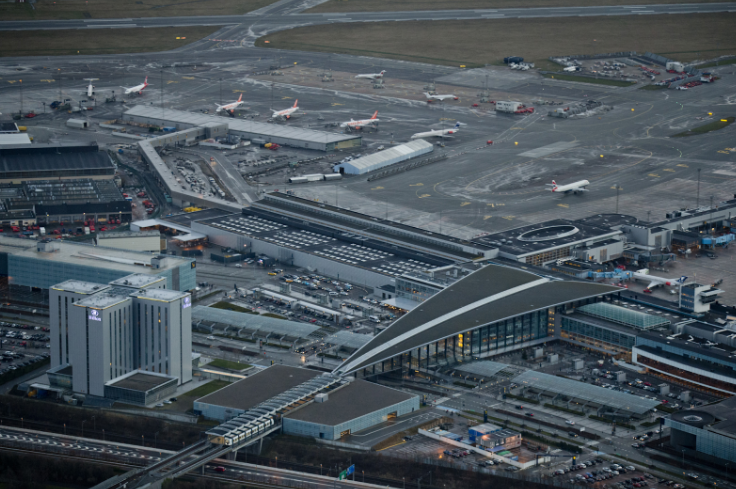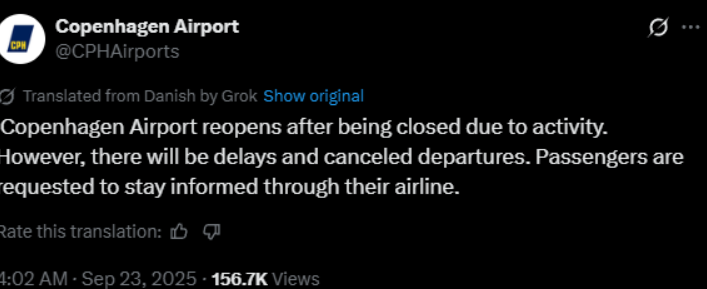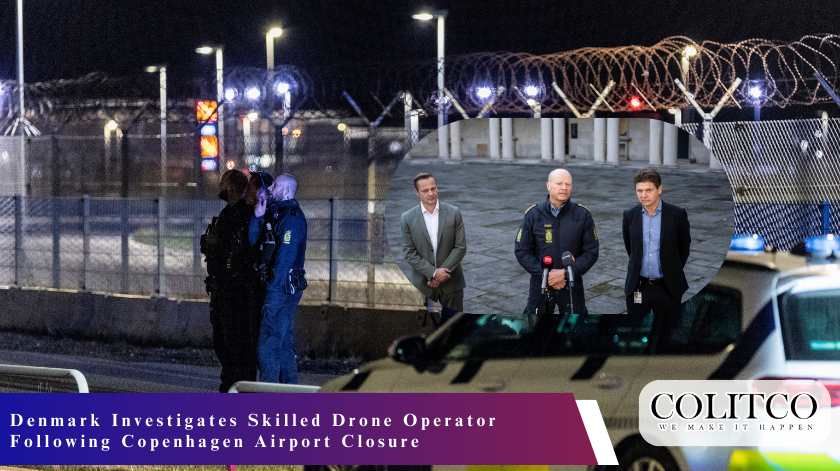Danish authorities have launched a comprehensive investigation into a sophisticated drone operation that forced Copenhagen Airport to shut down for four hours on Monday night. The incident affected approximately 20,000 passengers and has been labelled as the most serious attack on Danish critical infrastructure to date.
Police Identify Skilled Drone Operator
Copenhagen Police confirmed that two to three large unidentified drones were operated by what authorities described as a “capable actor”. Senior Police Inspector Jes Jespersen stated during a press conference that the operator possessed significant capabilities, willpower, and tools to demonstrate their skills.
The drones exhibited sophisticated flight patterns, approaching from multiple directions while systematically switching their lights on and off before disappearing after several hours. Police determined the operator appeared to be showcasing their abilities and potentially practising techniques rather than intending harm.
How big do you think this drone is in Copenhagen that shut down the airport?
It looks huge! 👀 #ufoX pic.twitter.com/pChFzl9K7r
— Astral🛸 (@The_Astral_) September 23, 2025
Airport Operations Severely Disrupted
Copenhagen Airport, Scandinavia’s largest aviation hub, suspended all takeoffs and landings from 20:30 local time on Monday. The closure affected 31 diverted flights and caused approximately 100 flight cancellations or delays. Flight-tracking service Flightradar24 reported 51 flight diversions and 109 cancellations.
Airport officials advised passengers to verify flight statuses with airlines as delays and cancellations continued into Tuesday morning. Normal operations resumed shortly after midnight local time.

Safety Concerns Prevent Drone Interception
Authorities chose not to shoot down the drones due to significant safety risks. Jespersen explained that the airport was full of passengers, with aircraft on runways and nearby fuel depots creating too great a risk for intervention. The decision prioritised public safety over immediate threat elimination.

Statement by Copenhagen Airport’s X handle
Investigation Examines Multiple Possibilities
Danish police are investigating several hypotheses about the drones’ origin and launch methods. Investigators are examining whether the drones arrived by land or were launched from ships in the busy shipping lanes near the airport. The Copenhagen Airport’s proximity to strategic Baltic Sea shipping routes has become a key focus of the investigation.
Police confirmed the drones travelled many kilometres to reach the airport, suggesting sophisticated planning and equipment. The investigation includes cooperation with Norwegian authorities following a similar incident at Oslo Airport the same evening.
Danish Leadership Labels Incident as Infrastructure Attack
Danish Prime Minister Mette Frederiksen characterised the incident as “the most serious attack on Danish critical infrastructure to date”. Speaking to reporters in Brussels, Frederiksen stated that the drone operation appeared designed “to disturb and create unrest”.
The Prime Minister indicated that all possibilities regarding responsibility remain under consideration. Frederiksen referenced recent patterns of drone incidents, airspace violations, and cyberattacks on European airports.

Danish Prime Minister, Mette Frederiksen
Russian Involvement Cannot Be Ruled Out
Danish authorities have not eliminated the possibility of Russian involvement in the drone incident. Frederiksen told Danish broadcaster DR that she “cannot rule out in any way that it is Russia”. The Prime Minister cited recent Russian drone incursions into Polish airspace and violations of Estonian airspace by Russian fighter jets.
Ukrainian President Volodymyr Zelensky posted on social media alleging Russian violation of NATO airspace in Copenhagen, though he provided no evidence for this claim. Kremlin spokesperson Dmitry Peskov rejected all allegations, calling them “unfounded accusations”.
Intelligence Services Assess High Sabotage Threat
Danish intelligence agency PET confirmed the country faces a “high threat of sabotage”. Operations Director Flemming Drejer suggested the incident’s purpose might be to create anxiety and observe Danish responses rather than launch direct attacks.
The Danish military has joined the investigation into the Copenhagen drone incident. Intelligence officials are examining whether the operation was designed to test Danish defence capabilities and response protocols.
Also Read: “We’re Screwed”: When a Robot’s Blink Feels Too Real
Similar Incident Affects Norwegian Airport
Oslo Airport in Norway experienced a concurrent drone incident that forced air traffic onto a single runway for three hours. Norwegian authorities diverted 14 flights during the closure. Police confirmed cooperation between Danish and Norwegian investigators to determine potential connections between the incidents.
Norway’s intelligence service PST has joined the investigation. Norwegian authorities reported Russia violated their airspace three times in 2024 after a decade without similar incidents.
Also Read: Adelaide Government House Arrest After Security Incident
European Aviation Security Under Scrutiny
The Copenhagen incident highlights growing concerns about aviation security across Europe. Recent weeks have witnessed multiple airspace violations involving Russian aircraft and drones in Poland, Estonia, and Romania.
NATO Secretary-General Mark Rutte warned Russia against continuing “dangerous patterns” of airspace violations. European airports have also faced cyberattacks, including systems failures at London Heathrow, Berlin, and Brussels airports.
Investigation Continues with International Support
Danish authorities continue their investigation with support from military forces and international partners. Police have implemented “a range of measures” as part of the ongoing probe, though specific details remain classified.
The investigation focuses on identifying the drone operator’s identity, establishing launch locations, and determining connections to broader European security incidents. Authorities maintain that no immediate suspects have been identified despite evidence of sophisticated planning and execution.












